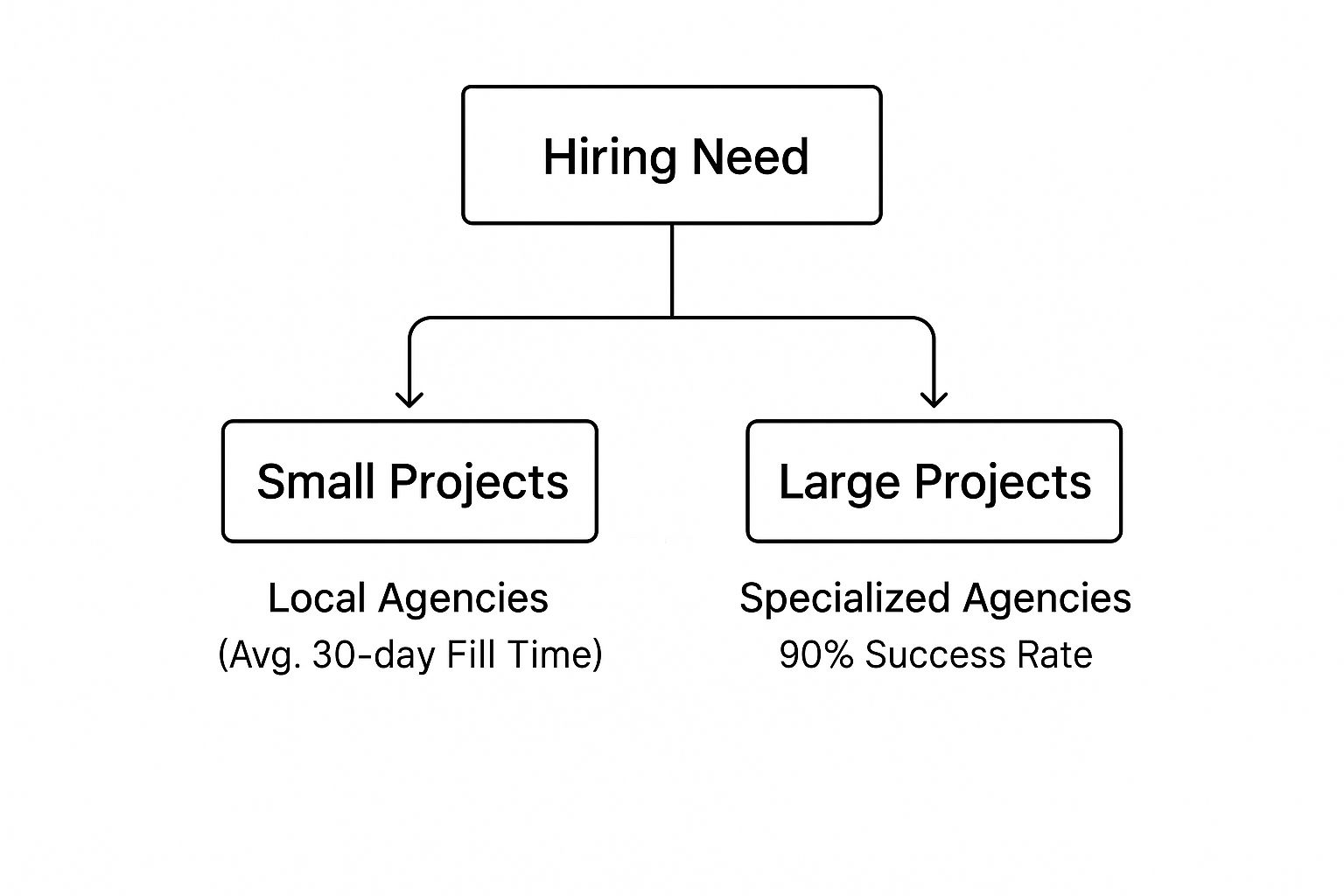Partnering with a project management recruitment agency is not merely about outsourcing HR tasks; it is a strategic decision to secure top-tier talent for your most critical projects. These specialist firms bring deep market knowledge and a curated network of professionals that generalist recruiters simply cannot match.
Why Specialist Recruitment Is Your Strategic Advantage

When a single project manager can determine the success or failure of a multi-million-pound initiative, settling for a generalist is a risk you cannot afford to take. A standard recruiter might find a candidate with "Agile" on their CV. However, a specialist understands the crucial difference between someone who attended a two-day workshop and a seasoned Scrum Master who has steered a team through a complex digital transformation.
This is precisely where project management recruitment agencies prove their worth. Their entire business is built on understanding the subtle details of project delivery methodologies, industry-specific hurdles, and the perfect blend of technical and soft skills that lead to success.
Deep Networks and Niche Expertise
Generalist recruiters cast a wide net, hoping for a good catch. Specialists, by contrast, have spent years cultivating deep talent pools. They are in constant conversation with the best active and passive candidates in the market—those high-performers who are not scrolling through job boards but are always open to the right opportunity. This gives you a direct line to a calibre of talent that would otherwise remain hidden.
Their expertise is granular, focusing on specific roles and qualifications:
- PRINCE2 Practitioners: They know how to identify professionals with a solid track record in structured, process-driven environments.
- Agile and Scrum Masters: They can properly vet for a genuine agile mindset and hands-on experience, not just textbook knowledge.
- Technical Project Managers: They understand specific technology stacks and can accurately assess a candidate’s ability to lead technical teams.
I have seen in-house teams struggle to properly vet candidates on complex methodologies. A specialist partner effortlessly fills this gap, ensuring you hire for genuine capability, not just keywords on a CV.
A Strategic Business Function
The demand for skilled project professionals is incredibly high. Research from the Project Management Institute suggests a need for approximately 2.3 million new project management recruits each year until 2030 in Australia alone, just to keep pace with industry demands. If you are interested in the details, you can explore the key findings in their report.
This significant talent gap underscores why partnering with an expert firm is so vital. They do not just fill a role; they provide market intelligence, salary benchmarking, and strategic advice to help you build a more resilient and effective project delivery team. Understanding the benefits of using a specialist recruitment agency is the first step towards making a more informed hiring decision.
Building Your Ideal Candidate Profile
Before you even consider contacting a recruitment agency, you need a crystal-clear picture of the person you are looking for. A vague job description is a magnet for unsuitable applicants and wastes everyone’s time. Your mission is to build a precise hiring brief that acts as a north star for both you and your recruitment partner.
This goes far beyond merely listing a few software skills or certifications. You need to start by defining the core business problems this new project manager will solve. Are you trying to sharpen your delivery timelines? Rescue a project that has gone off the rails? Or perhaps you need someone to manage complex stakeholder relationships on a new digital platform? Framing the role around the problems-to-be-solved immediately gives it strategic weight.
Moving Beyond the Job Description
A truly excellent candidate profile is a multi-dimensional document. It details not just what the person does, but how they need to behave and the impact they are expected to have. Consider the difference between asking for "experience with Jira" versus specifying "the ability to configure and manage complex Jira workflows for a multi-disciplinary team of 20+ to improve velocity by 15%." One is a task; the other is a result.
To build out this level of detail, I always recommend focusing on three core areas:
- Technical Competencies: Be specific. This includes methodologies (PRINCE2, Agile, SAFe), software (MS Project, Asana), and any industry-specific knowledge that is non-negotiable.
- Behavioural Traits: Define the soft skills that will make or break this role. Do you need a resilient negotiator for tough clients? An empathetic leader to mentor junior staff? Or a meticulous planner for a project drowning in compliance?
- Performance Outcomes: What does success look like in the first 90 days? What key metrics will this person be directly responsible for improving?
Gathering On-the-Ground Insights
Here is a professional tip: the most accurate profiles are built collaboratively. Your delivery teams—the very people who will work alongside this new hire—hold invaluable insights. Sit down with them. Ask practical questions. What are their biggest project frustrations at the moment? What specific skills would make their lives easier?
This collaborative approach ensures your profile reflects what is truly needed on the ground, not just what management thinks is needed. As you build it, consider what qualities define excellence in the field, such as a deep understanding of current project management best practices.
A detailed brief does not just help you find the right person; it empowers your recruitment agency to act as a genuine strategic partner. They can move from simply matching keywords on a CV to proactively searching for candidates who can solve your specific business challenges.
Investing this time upfront to create a robust and realistic profile provides a specialist recruitment agency with the single most important tool they need to find a candidate who will deliver real value from day one.
A comprehensive hiring brief is your foundation. Use this checklist to ensure you have covered all the critical details before you approach any agencies.
Hiring Brief Audit Checklist
| Category | Key Questions to Answer | Example |
|---|---|---|
| Role Context | Why does this role exist? What specific business problem does it solve? | "We need to rescue a delayed software implementation project and restore client confidence." |
| Key Responsibilities | What are the top 3-5 non-negotiable duties? | "Manage a £2M budget, lead a cross-functional team of 15, and report progress to C-level stakeholders." |
| Technical Skills | What specific tools, methodologies, and certifications are essential? | "Must have: PRINCE2 Practitioner, expert-level MS Project. Desirable: Smartsheet experience." |
| Behavioural Traits | What soft skills are critical for success in your culture? | "Requires high resilience for managing difficult stakeholders and strong empathetic leadership for a junior team." |
| Performance Outcomes | What does success look like at 30, 60, and 90 days? | "By Day 90, the project must be back on its original timeline and budget variance reduced to <5%." |
| Team & Reporting | Who will they report to? Who will they manage or work alongside? | "Reports to the Head of Delivery. Manages 2 Junior PMs and collaborates with the lead developer." |
| Logistics | What is the salary range, location (hybrid/remote), and start date? | "Salary: £70k – £85k. Hybrid (3 days in London office). Ideal start: early next month." |
Once this checklist is complete, you will have a document that not only attracts the right talent but also sets your recruitment partner up for immediate success.
How to Vet and Shortlist Recruitment Agencies

The market for project management recruitment is saturated. A quick search brings up dozens of agencies, and every one of them claims to be a specialist. The real challenge is not finding an agency; it is cutting through the marketing fluff to find a partner who genuinely understands your industry and has the network to back it up.
This is where you need to look past the slick website and dig into the tangible proof of their skills. A methodical approach is your best bet for building a shortlist of credible contenders who truly understand the unique demands of project management in your sector.
Look for Evidence of Specialisation
First and foremost: do they actually specialise in project management? A truly focused agency will not just have "Project Management" buried in a long list of twenty other industries they serve. Their entire online presence—from their blog posts to their case studies—should be steeped in the language and specifics of your world.
Here are the signs of a true specialist:
- Detailed Case Studies: Do not just look for wins; look for relevant wins. Do they showcase successful placements for roles like the one you're hiring for? The best case studies will detail project complexity, methodologies (like Agile or PRINCE2), and the real business impact the candidate made.
- Industry-Specific Insights: Check their blog or resources section. Are they just churning out generic content, or are they offering genuine analysis on project management trends? This demonstrates they are active participants in the industry, not just sideline observers. A great litmus test is seeing if their advice aligns with what recruitment agencies look for in a CV, which reveals their depth of knowledge.
- Consultant Profiles: A little LinkedIn investigation goes a long way. Check the profiles of the agency's consultants. Do they have a consistent track record of placing project managers, or are they generalists who filled a marketing role last week?
Scrutinise Testimonials and Reputation
Client testimonials can be a goldmine of information, but you must read between the lines. Vague praise like "they were great to work with" is pleasant, but it is not nearly as powerful as a testimonial that explains how the agency solved a specific, tough recruitment challenge.
I have seen so many businesses make the same mistake: they automatically choose a huge, well-known recruitment firm, thinking brand size equals expertise. More often than not, a smaller boutique agency has far deeper roots in a niche sector, giving them access to a more relevant—and frankly, higher-quality—talent pool.
This is especially true in the UK's recruitment landscape. While large firms dominate, SME recruitment agencies often possess invaluable, deep-seated networks that are an indispensable asset for clients who require genuine expertise.
Evaluate Their Candidate Network and Process
A top-tier agency does not just post an advertisement on a job board and hope for the best. Their real value lies in their curated network of passive candidates—those highly skilled professionals who are not actively job hunting but are open to the perfect opportunity.
As you conduct your initial research, look for signs of a proactive sourcing strategy. Do they attend industry events? Are they active in online project management communities? What does their professional network look like on platforms like LinkedIn? An agency with a strong, engaged following is far more likely to have the connections needed to find your ideal hire.
Doing this groundwork now helps you build a powerful shortlist before you even make a single call.
Asking the Questions That Reveal True Expertise
Once you have shortlisted a few potential project management recruitment agencies, the real work begins. Your first conversations need to go far deeper than a simple chemistry check. This is your chance to get under the bonnet, move past the polished sales pitch, and really interrogate how they deliver results.
Any agency can tell you they have a huge network and a formidable vetting process. Your job is to ask the questions that make them prove it. A great partner will not just post your job advertisement on a major job board and hope for the best; they will have a multi-channel strategy to unearth high-calibre candidates who are not even actively looking.
Probing Their Sourcing and Vetting Process
The quality of an agency lives and dies by the quality of its candidate screening. If you ask generic questions, you will get generic, rehearsed answers. Therefore, you need to be specific and dig into how they find and qualify talent before a CV ever lands in your inbox.
Here are a few targeted questions I have found that cut through the noise:
- “Walk me through a recent difficult-to-fill project manager role. Where did you find the successful candidate, and what made that search so challenging?” This question is brilliant because it forces a real-world example, revealing their problem-solving skills and sourcing creativity. Did they find them on LinkedIn, or did they have to do some real headhunting?
- “How do you technically screen candidates for methodologies like SAFe or PRINCE2 beyond just looking at certifications on a CV?” You are listening for substance here. Do they use behavioural interviews, scenario-based questions, or even technical assessments to validate hands-on experience?
- “What is your framework for assessing cultural fit and stakeholder management skills?” This is critical. A candidate can have the most impressive qualifications in the world, but they will fail if they cannot navigate your organisation's unique culture and politics. A top-tier agency will have a clear, structured approach for this.

As this illustrates, the decision between a generalist and a specialist often comes down to complexity. For those large, mission-critical projects, a specialised agency almost always delivers a higher success rate, even if the search takes a little longer.
Understanding Their Communication and Partnership Style
Let’s be honest, recruitment is rarely a perfectly smooth process. How an agency communicates when things get tough is a massive indicator of their value as a true partner. You need to feel confident that they will be transparent and proactive, not just disappear when challenges arise.
A great question to ask is, “If the first round of candidates is not hitting the mark, what is your process for recalibrating the search?” A strong partner will describe a collaborative effort. They will want to schedule a debrief, get granular feedback, and refine the search criteria—not just throw more of the same CVs at the wall and hope one sticks.
Their ability to manage your expectations is just as important. For more on this, check out our guide on how to ace your online interviews, which dives into why clear communication is a two-way street.
A truly expert agency sees a challenging brief not as a problem, but as a chance to demonstrate their market knowledge and consulting skills. Their answers should feel less like a sales pitch and more like a strategic consultation.
To help you structure these conversations, I have put together a quick table of questions to keep in your back pocket.
Key Questions to Ask Recruitment Agencies
| Question Category | Specific Question | What to Listen For |
|---|---|---|
| Sourcing Strategy | "Beyond job boards, what are your top 3 channels for finding passive project management talent?" | Evidence of a proactive, multi-channel approach (e.g., professional networks, industry events, direct headhunting). |
| Vetting & Screening | "Can you describe a time a candidate looked perfect on paper but you screened them out? Why?" | A nuanced understanding of soft skills, cultural fit, and red flags that go beyond a simple CV review. |
| Market Knowledge | "What are the current salary benchmarks for a Senior Project Manager with agile experience in our industry?" | Specific, data-backed figures, not vague ranges. This shows they are truly tapped into the current market. |
| Partnership & Process | "What is your communication cadence? How and when will we receive updates on the search?" | A clear, proactive communication plan. They should be setting the expectations, not waiting for you to chase them. |
| Handling Challenges | "What is your process if we are struggling to attract the right calibre of candidates for the role?" | A focus on collaboration, feedback, and strategy adjustment, rather than blaming the market or the brief. |
By asking these kinds of incisive questions, you transform the meeting from a sales pitch into a proper due diligence exercise. It is the best way to ensure you select a project management recruitment agency that can actually deliver on its promises.
Structuring a Partnership for Success

Signing the contract is not the finish line; it is the starting gun. To get the results you are paying for, you need to structure a partnership built on absolute clarity and mutual respect. This covers everything from the commercial terms down to the day-to-day rhythm of how you work together.
First up, let’s talk money. Most agencies operate on one of two models: contingency or retained.
A contingency search is your classic "no win, no fee" arrangement. You only pay the agency if you actually hire a candidate they have put forward. It is a solid choice for less urgent or more junior roles, especially when you might have a few agencies on the hunt.
The alternative is a retained search, which involves an upfront fee to lock in the agency's dedicated services. This is the preferred route for senior, business-critical, or highly specialised roles. A retainer guarantees their focused attention and a far more exhaustive search process, effectively making them a dedicated partner in your hiring strategy.
Navigating the Fine Print
Whichever model you land on, the contract’s fine print needs close inspection. Two clauses, in particular, deserve your attention: exclusivity terms and rebate periods.
- Exclusivity terms give the agency the sole right to fill a role for a specific period. In exchange for this commitment, you can often negotiate a better fee. It is a trade-off between casting a wide net and getting a dedicated, more invested service.
- Rebate periods are your safety net. This clause means that if a candidate leaves within a set timeframe (usually the first three to six months), you get a partial refund or a free replacement search. It is a non-negotiable for protecting your investment.
Your relationship with a recruitment agency should be more than just a transaction. Treat it as a genuine strategic partnership where transparency, timely communication, and mutual trust are the foundations of success.
The Unwritten Rules of a Great Partnership
Beyond the legal contract, how you collaborate operationally will make or break the outcome. The most effective approach is to treat your recruitment partner as an extension of your own team. This is a mindset shift from a simple client-vendor dynamic to a truly collaborative one. Viewing your agency through the lens of strategic partnership management is the key to unlocking long-term value.
The single most impactful thing you can do? Provide transparent and timely feedback on every single CV they send.
Do not just say “no.” Explain why. Was their stakeholder management experience not deep enough? Did their approach to risk mitigation feel too academic? This kind of detailed feedback is gold for a recruiter. It allows them to fine-tune their search with surgical precision and find you the perfect fit, faster.
When your agency feels like a valued and informed partner, their commitment skyrockets. It transforms their performance from simply filling a role to finding the absolute best person for your team.
Navigating the Modern Project Management Talent Market
The project management landscape is shifting, and if your hiring strategy is not keeping pace, you risk being left behind. It is a common mistake to look at the flood of applications for a single role and think it is an employer's market. That could not be further from the truth.
Even with economic uncertainty, the project services sector remains surprisingly resilient. It is not unusual for a specialist recruitment agency to see anywhere from 750 to 1500 applications for one PM role. But here is the catch: this avalanche of CVs often hides a massive skills gap, making it harder, not easier, to find genuine top-tier talent. You can get more insights on current project recruitment trends on Talent International.
This is precisely why partnering with a specialist agency is no longer a luxury—it is a necessity. They have the expertise to cut through the noise and separate the practitioners with real-world skills from those who just know how to stuff their CVs with the right keywords.
The Rise of AI and Data Analytics Skills
One of the biggest shifts we are seeing is the integration of artificial intelligence into project delivery. Yesterday's project manager was a master of Gantt charts and budgets; tomorrow's needs to be just as comfortable with data, automation, and predictive modelling.
Companies are now hunting for candidates who have more than just a passing familiarity with emerging tech. They need people who understand:
- Generative AI: How can it realistically be used to automate routine work like reporting or risk analysis?
- Large Language Models (LLMs): What are the real-world implications for stakeholder communications and project documentation?
- Machine Learning: How can predictive analytics actually improve project forecasting and resource allocation, not just in theory?
Your recruitment partner needs to be able to dig deep into these forward-looking skills. This means moving beyond buzzwords and asking sharp, scenario-based questions that reveal how a candidate thinks strategically about technology.
To get this right, you first need to grasp the unique demands and operational frameworks of today’s project world. An ultimate guide to project management for agencies provides that crucial context, helping you position your roles to attract the forward-thinking leaders you actually need.
Attracting Tomorrow's Project Leaders
Finally, remember that attracting the best talent is about much more than just a competitive salary. Top candidates are looking for a culture that genuinely fosters innovation and gives them room to grow.
Work with your agency to highlight the real opportunities for learning and development, especially around new technologies. Show them how your organisation is embracing change and investing in the tools and training that will shape the future of project management. By positioning your company as a place where leaders can build what is next, you will attract professionals who are ready to drive not just today’s projects, but tomorrow’s as well.
At Redwolf Rosch, we have deep expertise in identifying and placing project management professionals who possess the skills needed for today and the vision required for tomorrow. If you are looking for a trusted, high-performing recruitment partner to navigate the complexities of the current talent market, get in touch for an introductory discussion today.
 Submit CV
Submit CV Submit vacancy
Submit vacancy  Call for a Candidate
Call for a Candidate